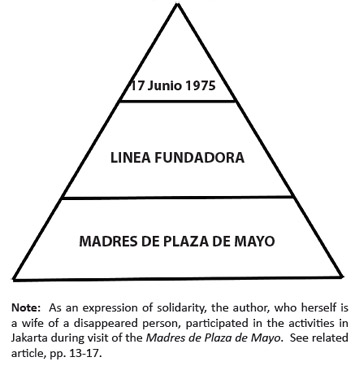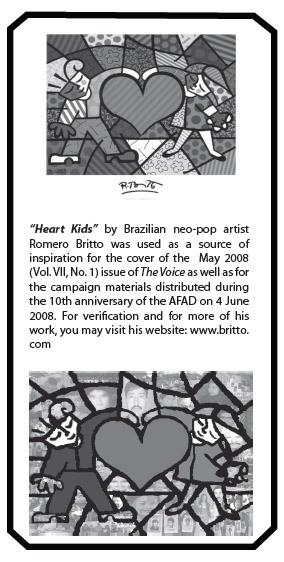Report on the Lobby for the United
Nations Convention For the Protection of All Persons from Enforced
Disappearance and Workshop of Women Human Rights Defenders
Jakarta, Indonesia > 19- 21 April 2009
By Angkhana Neelaphaijit
Working Group on Justice for Peace (WGJP)
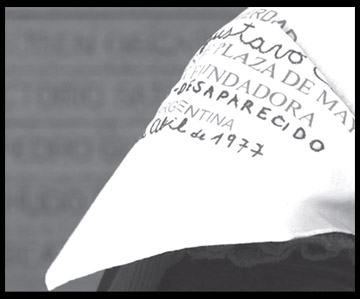
Internal Discussion with victims, sharing experience and methods of
advocacy
In 1998 under Suharto regime, a crackdown was launched to break the
demonstration of villagers in Klender, Jakarta, who demanded justice.
Several of them who fled for refuge in the mosque were shot dead by the
officials. Many went missing and none of the bodies was retrieved. Klender
is a slum and during rainy seasons, it often has to suffer from floods.
Most people’s source of living is scavenging.
The campaign drew participation of affected persons
from various parts of Indonesia including Papua, New Guinea, Timor Leste,
Sulawesi and Aceh. Most of the survivors of disappeared persons are women,
but in a Muslim country, women are not allowed to become leaders.
Papua - Due to violent political crackdowns,
many people have been killed. Papua wants to gain independence from
Indonesia. Every year, a commemoration is organized for the losses. Every
time, people rose up to demand justice, they become victims of violence.
Timor Leste - An attempt is being made there to
form a network to track down those who have been disappeared since 1991
until now. Exhumation has been carried out in cemeteries, but this failed
to shed light on the missing persons. The Indonesian government never pays
attention to this issue.
|
Visit of Las Madres of the Plaza de Mayo
Jakarta, Indonesia
16-22 April 2009
Thursday, 16 April 2009
• Press release on the visit of the Madres de Plaza de
Mayo and mothers in Jakarta
• Black Thursday silent demonstration at the Aksi Kamisan,
in front of Presidential Palace
Friday, 17 April 2009
• Meeting with Komnas HAM, lobby for the UN Convention
For the Protection of All Persons from Enforced Disappearance. The
chief of Komnas HAM promised to bring this proposal to the
National Legislation Program.
• Visit to Komnas Perempuan (National Commission on
Violence Against Women)
Sunday, 19 April 2009
• Visit to May Riots Community. Sharing of experience of
Ruminah., one of the mothers of the victims.). Attending this
meeting were Angkhana Nelaphajit, 2 mothers from East Timor,
mother from Papua, mother from Aceh.
Monday, 20 April 2009
• Discussion at KontraS office with the victims of
human rights violations : Strengthening the human rights
movement’s solidarity in struggling for justice.
Tuesday, 21 April 2009
• Women human rights defenders’ gathering at Komnas
Perempuan : Struggle of the mothers of victims of human rights
violation on the reflection of Kartini’s Day
• Participants : Mothers of the Plaza de Mayo; Angkhana
Nelaphajit; mothers from Timor Leste (2 persons); Suciwati;
mothers of the disappeared in Indonesia, e.g. Ibu Tuti
Koto, Ibu Sipon, Ibu Nurhasanah, Ibu Misiati;
mothers in Talangsari case,; Tanjung Priok case, May Riots, Aceh
and Papua.
Wednesday, 22 April 2009
• Public Lecture: Major Women, Politics and Latin
America.
• Place : Faculty of Social and Politics, University of Indonesia |
The Truth Commission has been formed in Timor Leste and
people are monitoring the work of the Commission. Relatives of the
disappeared have submitted their reports to the Government, but they never
received a single reply from the President of Indonesia. The people still
look forward to attaining peace and getting help from NGOs. In Timor Leste,
many people have still been incarcerated as political prisoners. Those who
have been discharged fail to get jobs and the government does not pay
attention to this issue.
People who fight for Freedom continue to be victimized…
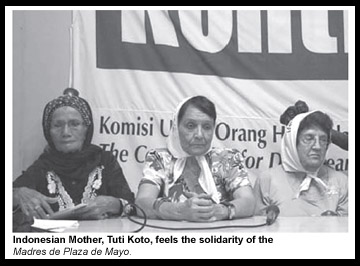
Aceh - Some victims have been tortured including
those being hung from choppers, and they are being killed. Many were shot
dead after being arrested. As a consequence, many have suffered from
physical disabilities. Women who have come out to demand justice are
accused of being part of the secessionist movement. The people of Aceh
have been victims of conflicts, violence and Tsunami.
Without Justice, There is No Forgiveness
Madres de Plaza de Mayo-Argentina
After the revolution in Argentina in 1983, 23,000 people have been
abducted. Many mothers have lost their children. They have been taken away
by the military as they were demanding for a better living condition of
all people.
After the revolution, 14 mothers were gathered in front
of the President’s residence. The law still banned a gathering of more
than three persons. While they were protesting, the military officials
were patrolling around them. They were dubbed as “crazy women” and later,
as more of them got arrested, many more mothers have come out. This area
is called the Plaza de Mayo.
Demanding for Justice
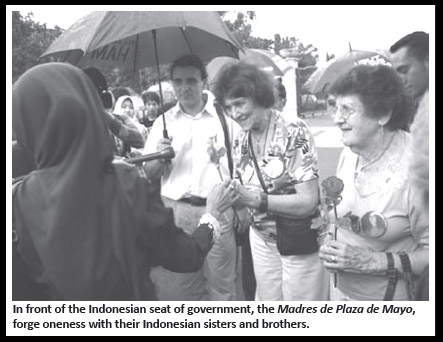
From a group of 14 others at the beginning, now, there
have been many more women joining the demonstrations. They learned that
their children were taken on choppers and dropped alive in the middle of
the ocean. Many of their bodies were found floating. Laws have been
revised to provide for tracking down the disappeared. The women have
carried out exhumations in various cemeteries to look for the bodies of
their children by matching the DNA of those corpses with their children.
Several bodies have been retrieved.
Many women were arrested while they were pregnant. They
were killed after delivering their babies. Thus, there were about 500
orphans in Buenos Aires. No one knew who their parents were. Later, the
Madres de Plaza de Mayo asked for DNA tests among these children, and
some of them were able to get several of their grandchildren back in 1986.
In 1986, Argentina’s Constitution provided for justice and helped to hold
officials liable for their offense. But not many of the perpetrators were
punished. Thus, the people kept pressuring the government. They demanded
that all perpetrators be held liable for their crime. Many mothers who
joined the movement since the beginning have died. The rest are in their
eighties, more than 20 of them. They have received death threats, but
these threats have failed to deter them from demanding justice.
Below is the triangle banner on their headband:
Without Justice, there is no forgiveness. Never forget!
